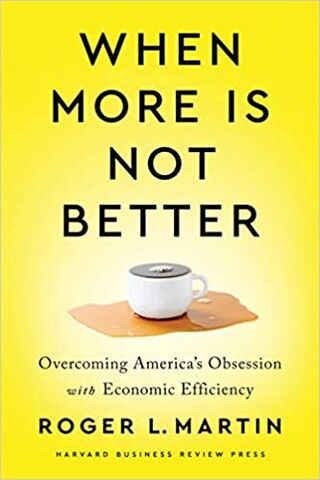Resilience
How Efficiency and Resilience Can Coexist
A new book addresses America's obsession with economic efficiency.
Posted September 29, 2020
Frederick Taylor did a doozy on us with his efficiency methods. Known as Taylorism, scientific management or the optimization of processes to save time and effort is the underlying current in U.S. economic activity to this day. Taylor’s economic theology hails efficiency as the god lording over our lives. And it has led to more despair than we could have ever imagined.
Roger Martin wants to change all that. In his new release More Is Not Better: Overcoming America's Obsession with Economic Efficiency, the professor emeritus from the Rotman School of Management at the University of Toronto claims democratic capitalism is in peril based on unprecedented economic disparity. He claims that the nation’s economy is not a perfectible machine, but rather an adaptive, complex system requiring a balancing act between efficiency and resilience. Progress, not perfection, is the goal.

One particular story in the book stood out as it exhibits a kind of conscious leadership not easily found in our capitalist system. Joe’s Stone Crab in Miami Beach is a seasonal restaurant that has been in business for 116 years. Considered one of the 100 top-grossing independent restaurants in the United States, Joe’s success is even more remarkable, given the establishment is closed for three months out of the year when the stone crabs are no longer in season. From the staff to the customers to the suppliers, the restaurant’s success lies in its effective balance between efficiency and resilience. The staff are paid much higher wages than the industry standard and while the average annual turnover in the US restaurant sector is 75% (or a duration of sixteen months per staff member), Joe’s employees stay with the company for an average of fifteen years. The maître d’ has been there since 1971, a record forty-eight years. In scanning the room, the author noted the diversity of customers: from twenty-somethings in T-shirts and flip flops to elderly women dressed to the nines, the menu offers something for everyone. Even the suppliers are happy as they pay them well. Joe’s logic: to sustain a fisherman or fisherwoman’s family means lifelong loyalty, possibly over generations. At one point, when they created a larger bar area, they had to eliminate some tables. Short-term they may have sold fewer meals, but the efficiency in separating table-ordered drinks from bar-ordered ones meant the bartenders and wait staff were more relaxed and faster while the customers were served more quickly.
Martin says we all have a stake in democratic capitalism—not just business executives and educators, but political leaders and citizens too. In a system that allows billionaires to pay little to no taxes, a few win while the rest lose. A more holistic approach to how we run our lives and our businesses will create a more cohesive and healthier society, something we all want. Especially now.


